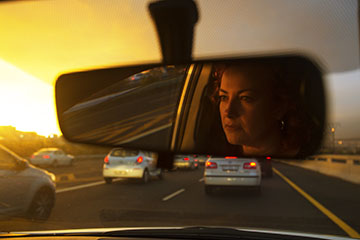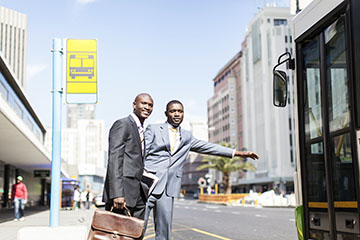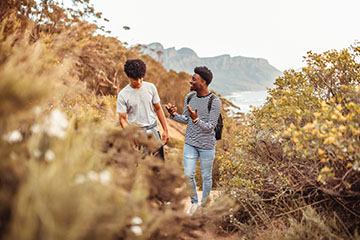Building caring communities together
Showing respect and concern for other people, regardless of race, gender, religion, or sexual orientation, is central to our collective South African culture and critical to creating a harmonious and peaceful society for everyone. By recognising our diverse backgrounds and cultures, we can commit ourselves to the ideals and ethical values that unite us as a country.
Caring for our families, communities, and the environment is central to being human. We shouldn't let the stress of our fast-paced lives take away our respect for each other.
Parenting
Parenting is a demanding but fulfilling role. Raising children to become responsible and contributing citizens should be the focus of any parent.
The manners, discipline, and morals our parents and teachers instill in us as we grow up determine who we are as adults. Children learn through what we say and teach them - but more importantly, by the attitudes and behaviours we display.
We should teach children to:
- Respect themselves, their friends, and classmates.
- Learn boundaries of what's acceptable behaviour at home and in public.
- Show respect for older persons.
- Use good social manners (please, thank you, greetings).
- Offer their seat to older persons, disabled and pregnant commuters on public transport.
- Respect their school, teachers, and peers.
- Always be honest and help those less fortunate than they are.
Children who know their parents love them are positively encouraged and taught to love and respect themselves and are equipped to face life’s challenges. These children have better self-esteem and are more likely to make better decisions not based on peer pressure.
Find out about family planning to better prepare you for when you're ready to have a family.

We spend most of our day at work, and it’s important to maintain working relations by being respectful and considerate of our colleagues. While most workplaces have codes of conduct, we sometimes forget what's acceptable behaviour when we’re at work.
1. Respect
Respect goes a long way in building professional relationships. Respect your colleague's possessions and work areas. Be mindful of arriving early to meetings and remember to greet with a smile.
2. Avoid office gossip
Stay clear from gossip and rumours because it can create unnecessary tension and damage relationship building.
3. Courtesy is key
Always be kind and helpful to your colleagues. When you go the extra mile for them, they’ll go the extra mile for you.
Road behaviour 
We all seem to be rushing somewhere in our cars. This often leads to inconsiderate road behaviour and can escalate to road rage.
It’s important to remember that we share the roads, and we should never allow our emotions to place our lives and the lives of others in harm’s way. The rules of the road are there to ensure your safety. Ignoring these rules, often, places lives at risk.
Do’s and don’ts for motorists:
Do’s
- Always be patient. Do not exceed the indicated speed limit. Many impatient drivers cause accidents when they drive recklessly.
- Give yourself more time. By leaving earlier, you won’t need to rush.
- Be patient and show consideration. Allow merging traffic to merge into your lane. Move out of the way of emergency vehicles, and respect the safety of cyclists, motorcyclists and pedestrians who are more vulnerable to injury than you.
- Always indicate and ensure it’s safe before turning, changing lanes and while in a traffic circle.
Obey the road signs. They are there to ensure our safety. Ignoring signs places you and other road users at risk. Remember, always fasten your seat belt. Statistics show that if you and your passengers buckle up, you are much more likely to survive an accident. Refrain from excessive and unnecessary hooting.
Don’ts
- Don't weave in and out of lanes, as it doesn't allow other road users enough reaction time.
- Don’t tailgate (aggressively drive closely behind someone), flash your lights, or hoot at someone driving too slowly for your liking.
- Driving while sending text messages or talking on your phone reduces your ability to make quick decisions in an emergency. It also reduces the concentration needed to safely navigate traffic and road conditions. Remember #ItCanWait.
- Never drive under the influence of alcohol, heavy medication or illegal drugs.
Other road users:
Pedestrians
- Always walk on the pavement and remember that pedestrians aren't allowed on the highway.
- Look both ways before crossing a road.
- Where there are pedestrian crossings, wait for cars to stop before you walk.
- Cross the road quickly and remain observant until reaching the other side.
- Alcohol and drugs diminish your judgement when walking on pavements and crossing roads.
Cyclists
- Stay as close to the side of the road as possible.
- Use hand signals to indicate if you're turning.
- Cycle in a single file and never alongside other cyclists.
- Be aware and considerate of pedestrians and other road users.
Motorcyclists
- Follow the rules of the road.
- Follow speed limits and obey restrictions.
- Be extra cautious during wet and foggy weather, with reduced visibility when more reaction time is needed.
- Always wear a helmet. This applies to passengers too.
- Do not ride behind big vans and trucks, as it’s difficult to see around the vehicle, and the driver might not be able to see you.
- Always use your indicators to signal your intended direction.
- Although weaving between cars (also called lane-splitting) isn’t illegal, it’s best to do it when it’s safe. When a motorist blocks you from lane-splitting, it’s within their rights to do so, as they have no legal obligation to allow lane-splitting. Motorcyclists and motorists shouldn’t make reckless moves that may endanger the lives of other road users.
Visit our Safely Home site for more road safety information.
Public transport 
For many of us, public transport is our primary mode of transportation. Thousands of people use a train, bus, or taxi to get from point A to point B. With so many of us sharing our personal space, we need to be mindful of the following to avoid unnecessary discomfort:
- Don't eat when you’re using public transport.
- Don’t throw litter out of the windows of public transport. Throw it in the bins at the station or bus terminus. If there’s no place to dispose of the items, keep them and throw them away in the nearest bin or at home.
- Avoid your comfort from becoming the discomfort of fellow commuters.
- Don’t take up 2 seats.
- Don't place your bag on an open seat.
- If you're about to board a bus or train, allow boarded passengers to exit first.
- Be respectful to the driver and other staff.
- Please respect the privacy of other commuters. What they’re doing is none of your business.
- Use headphones/earphones when listening to music and keep the volume at a level only you can hear.
- Give your seat to those who need it, like the elderly or pregnant women.
- Don’t vandalise the trains, busses or infrastructure.
- Don’t use the train as your soapbox or to evangelise other commuters.
- Cough into the inside of your elbow to limit the spread of germs.
- If you’re travelling by train, sit in the carriage indicated on your ticket, e.g. metro or metro plus.
- If you’re using MyCiti busses, don’t sit on the red seats marked for the elderly, disabled or frail.
Let’s play our part and make public transport a better experience for everyone.
Public spaces 
We all share a beautiful country with many public spaces made available for us to enjoy the tranquil and scenic outdoors. We also share areas such as pavements, malls and stadiums. To ensure that we all enjoy these spaces equally, remember to be considerate of others by:
- Not playing loud music.
- Ensuring that activities such as playing with balls or a frisbee don’t disturb anyone else.
- Close taps after using it. Don’t waste water.
- Keeping your area clean by removing rubbish such as paper plates, plastic containers and packets.
- Not blocking pavements or passageways for others to pass by.
- Not bumping into others in shopping centres, and always being mindful of others around you.
When we're respectful, considerate and helpful toward each other, then we are truly Better Together.
Visit one of our tranquil reserves managed by CapeNature.


